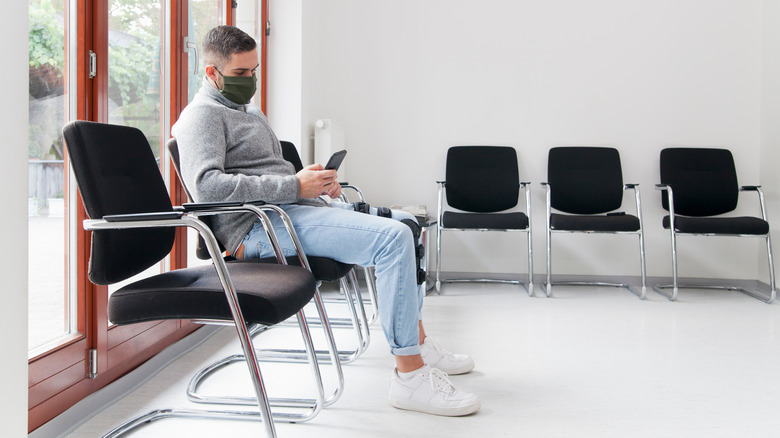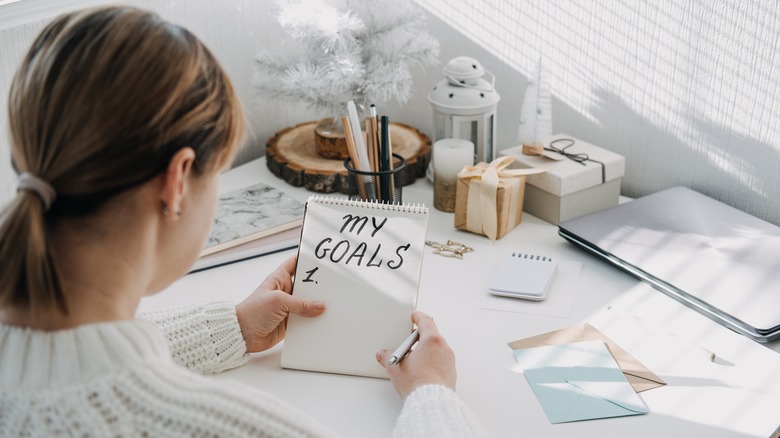Starting Therapy? Here's What To Expect In Your First Session
Sure, middle parts and '90s themed attire have been on trend this past year, but quite possibly the biggest trend has been the focus on our mental health. According to the American Psychological Association, more people have sought out therapy than ever before, with psychologists reporting large waitlists and an increase in new patients.
But even more than just seeking out help for mental disorders, people are also becoming much more open about their struggles and their desire to find help. A survey done by the APA showed that 87% of Americans think that having a mental disorder is "nothing to be ashamed of" and 86% believe that treating a mental health disorder is possible. If you are ready to join your peers and fellow Americans and finally start getting help for your mental health issues, whether it's anxiety, depression, or an array of other disorders like addiction, OCD, or even sleep-related anxiety, here's what you can expect from your very first session.
Get to know the waiting room
Calling and making an appointment for your first therapy session is something to be proud of. In fact, it may just be the hardest step when it comes to seeking help for your mental health, especially since finding the right therapist isn't easy. And while therapy is not quite the same as going to your primary care doctor for an annual checkup, the beginning stages of a therapy session may remind you of a doctor's office.
Before you get to meet with your therapist, you will likely first meet the receptionist, who will sign you in and give you a few papers to fill out. After this, be prepared to wait. Some people may feel their anxiety start to bubble up waiting for their turn, but if you are expecting a long wait, there are ways you can help combat those feelings. Michelle Davis, PhD, a licensed clinical psychologist in California, recommended to Psych Central a few tricks to keep the racing thoughts at bay while waiting for your session to start. Bring your AirPods to listen to your favorite tunes or even pack a few fidget toys to play with. She also recommends deep breathing and turning your focus to the positive reasons you are waiting.
Introductions with your therapist
Once you are called back to the room, the real therapy begins. Your first session may look a bit different from all the sessions to follow as you and your therapist are both getting to know each other. Your therapist will likely keep things light and simple to start and may even try and find some common ground, per Good Therapy. This can be as simple as talking about your favorite movie.
Many therapists will then have you just talk about what's going on in your life right now, what you are looking forward to, what you are worrying about, and more. This is usually a time for you to express yourself without interruption and while this is therapeutic in itself, it is also a great way for your therapist to get to know the real you a bit better. The best thing you can do during this time is be open and honest — your therapist is not there to judge you and everything you say in that room is confidential.
A lot of questions
Once you have expressed yourself a bit, your therapist will likely start a round of questions. As you continue going to sessions, these questions will become more personalized and tailored to you and your specific concerns. But in the first session, they will likely be a bit more broad. You can expect to be asked simple questions like whether or not you've been to therapy before, if there is any family history of mental health disorders, and what your home, work, and social life looks like. Your therapist will also likely ask you what you expect to gain from therapy.
But your therapist isn't the only one who can ask questions during this time. Don't be afraid to come prepared with a list of your own questions, no matter how small, to ensure you feel 100% comfortable with the provider you chose. Some of the questions you can ask include any worries you have about confidentiality, and even more personal questions like how long they have been practicing therapy, if they have gone to therapy themselves, and whether or not they have treated many people with the same mental health issues that you have.
Setting your goals
All of those questions will give you and your therapist a clearer idea of what you hope to achieve from therapy. During therapy, your therapist will work with you to help you get closer to living the life you hope to have. By being open with your therapist and setting goals, each session should bring you a bit closer to that life.
Overall though, therapy will look different for everyone. Some people simply need one good talking session to realize where their mental health is going sideways and not have to return to therapy. Others may need weeks, months, or even years to get through their issues. Some people who go to therapy have one specific issue they want to work on while others may have an array of problems that they need to work through. No matter what your reason for attending therapy in the first place, your first session will help you understand your true goals and just how you'll go about achieving them.
Homework
Yes, you read that right. Your first session may have you coming home with some more work to do. This homework is usually a mix of things you should do for yourself and things your therapist asks you to do before your next session. The first thing you need to do after your first session is think about how it made you feel. Good Therapy recommends asking yourself if you really connected with your therapist. If you can't fully answer yes to this, you may want to reconsider your provider and find someone new. Therapy can be a long game for people, so you want to be comfortable with your therapist and fully able to express your true self.
In addition, your therapist will likely give you some homework of their own to complete. Psychologist Suzanne Gelb told Psychology Today that she often gives her patients a task, whether it's to move a bit more, start journaling each night, or even to research more about therapy so you can come back the next session with a clearer idea of how things will go. No matter what, though, going to that first session is a major milestone in working towards better mental health and regardless of how it goes, you should feel proud of yourself for getting there.





